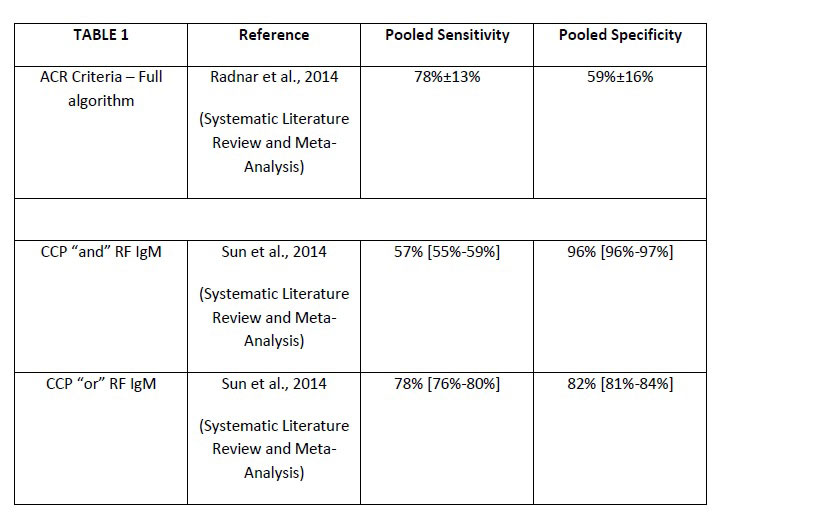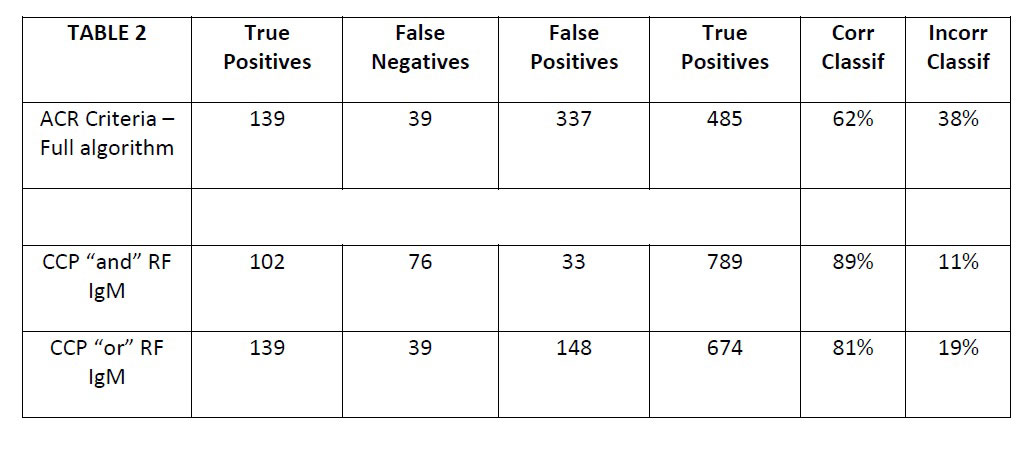Session Information
Date: Sunday, November 10, 2019
Title: RA – Diagnosis, Manifestations, & Outcomes Poster I: Risk Factors, Predictors, & Prognosis
Session Type: Poster Session (Sunday)
Session Time: 9:00AM-11:00AM
Background/Purpose: The 2010 ACR/EULAR classification criteria for Rheumatoid Arthritis (RA) are based on a combination of clinical, laboratory, and imaging investigations. Positive serology contributes to the final score when subjects are either positive to CCP or RFIgM; scoring increases based on the strength of an individual test. No more points are awarded to a patient having one versus two serologies positive.
The aim of this study was to model the clinical diagnostic outcomes between the ACR/EULAR full algorithm versus serology alone analyzing different combinations of serological positivity (single versus double positive).
Methods: We simulated a cohort of 1000 RA-suspected individuals and calculated the number of correctly/incorrectly classified subjects using the diagnostic accuracies listed in Table 1; results were compared to the ones generated by the full 2010 ACR/EULAR algorithm.
Results: Compared with the 2010 ACR/EULAR diagnostic criteria (Table 2), serology used in isolation in the current ACR/EULAR definition “CCP or RFIgM” reduces False Positives from 337 to 148 respectively, thereby diminishing the misclassification rate by 50%. Combined positivity to both tests (“CCP and RFIgM”) decreases False Positives by 90%, but False Negatives increase from 39 to 76 (49% increase); overall, misclassification by this methodology drops to 11% from 38% compared to the full ACR/EULAR criteria.
Conclusion: Results show that serology used in isolation and interpreted as “CCP and RFIgM” can reduce misclassifications and may be useful in adding to the 2010 ACR/EULAR classification criteria. Individuals either positive to one test or seronegative should be re-assessed with the other examinations listed within the criteria to reach a final diagnosis.
To cite this abstract in AMA style:
Mascialino B, Tarrant T. Should There Be Hierarchical Scoring Applied to Serologic Testing in the 2010 ACR/EULAR Classification Criteria? [abstract]. Arthritis Rheumatol. 2019; 71 (suppl 10). https://acrabstracts.org/abstract/should-there-be-hierarchical-scoring-applied-to-serologic-testing-in-the-2010-acr-eular-classification-criteria/. Accessed .« Back to 2019 ACR/ARP Annual Meeting
ACR Meeting Abstracts - https://acrabstracts.org/abstract/should-there-be-hierarchical-scoring-applied-to-serologic-testing-in-the-2010-acr-eular-classification-criteria/


